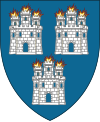Portal:European Union
Introduction
The European Union (EU) is a supranational political and economic union of 27 member states that are located primarily in Europe. The Union has a total area of 4,233,255 km2 (1,634,469 sq mi) and an estimated total population of over 449 million. The EU has often been described as a sui generis political entity combining the characteristics of both a federation and a confederation. Containing 5.8% of the world population in 2020, EU member states generated a nominal gross domestic product (GDP) of around US$16.6 trillion in 2022, constituting approximately one sixth of global nominal GDP. Additionally, all EU states except Bulgaria have a very high Human Development Index according to the United Nations Development Programme. Its cornerstone, the Customs Union, paved the way to establishing an internal single market based on standardised legal framework and legislation that applies in all member states in those matters, and only those matters, where the states have agreed to act as one. EU policies aim to ensure the free movement of people, goods, services and capital within the internal market; enact legislation in justice and home affairs; and maintain common policies on trade, agriculture, fisheries and regional development. Passport controls have been abolished for travel within the Schengen Area. The eurozone is a group composed of the 20 EU member states that have fully implemented the economic and monetary union and use the euro currency. Through the Common Foreign and Security Policy, the union has developed a role in external relations and defence. It maintains permanent diplomatic missions throughout the world and represents itself at the United Nations, the World Trade Organization, the G7 and the G20. Due to its global influence, the European Union has been described by some scholars as an emerging superpower. In 2012, the EU was awarded the Nobel Peace Prize. The United Kingdom became the only member state to leave the EU, in 2020; ten countries are aspiring or negotiating to join it. (Full article...) Selected article Same-sex marriage in Spain was legalised in 2005. In 2004, the new Socialist government, led by President José Luis Rodríguez Zapatero, began a campaign for its legalization, which would include adoption by same-sex couples. After much debate, a law permitting same-sex marriage was passed by the Cortes Generales on 30 June 2005 and published on 2 July 2005. Same-sex marriage officially became legal in Spain on Sunday, 3 July 2005. The ratification of this law has not been devoid of conflict, despite support from 66% of Spaniards. Catholic authorities in particular were adamantly opposed to it, fearing the weakening of the meaning of marriage. Demonstrations for and against the law drew thousands of people from all parts of Spain. Approximately 4,500 same-sex couples have married in Spain during the first year of the law. Shortly after the law was passed, questions arose about the legal status of marriage to non-Spaniards whose country did not permit same-sex marriage. A ruling from the Spanish Justice ministry stated that the country's same-sex marriage law allows a Spanish citizen to marry a non-Spaniard regardless of whether that person's homeland recognizes the partnership. At least one partner must be a Spanish citizen to marry. Selected picturePhotograph: David Iliff The House of the Blackheads is a building in the old town of Riga, Latvia. The original building was erected during the early 14th century for the Brotherhood of Blackheads, with major work completed in 1580 and 1886. In 1941, the original building was bombed by the Germans; the ruins were demolished by the Soviets seven years later. The current reconstruction was erected from 1995 to 1999.
Did you know?...that "Nocturne" is the Eurovision Song Contest winner with the fewest words, the Norwegian language original having only 25?  ...that the Eastgate Clock (pictured) in Chester is the second most photographed timepiece in the United Kingdom, after Big Ben? ...that "Kinek mondjam el vétkeimet?" received three perfect scores at the start of voting in the Eurovision Song Contest 1994 before ultimately coming in fourth, making Hungary the only debuting nation to lead the voting? Selected cityDublin is the capital and the largest city of the Republic of Ireland, located near the midpoint of Ireland's east coast, at the mouth of the River Liffey and forms the centre of the Dublin Region. Originally founded as a centre of Viking settlement, the city has been Ireland's capital city since mediæval times. The population within the city was 505,739 at the census of 2006. Beyond this, at the same census the Dublin Region population was 1,186,159, whilst the Greater Dublin Area had a figure of 1,661,185. In a 2003 European wide survey by the BBC, questioning 11,200 residents of 112 urban and rural areas, Dublin was found to be the best capital city in Europe to live in, and the Republic of Ireland was judged to be the most content country in Europe. A person from Dublin is known as a Dubliner or colloquially as a Dub. Dublin is a major European cultural centre and the origin of many prominent literary figures including Jonathan Swift, Bram Stoker, Oscar Wilde, William Butler Yeats, James Joyce, George Bernard Shaw, Seán O'Casey, and Samuel Beckett. General imagesThe following are images from various European Union-related articles on Wikipedia.
TopicsFeatured contentFeatured articles
Featured lists
Featured contentGood articles
CategoriesRelated portalsAssociated WikimediaThe following Wikimedia Foundation sister projects provide more on this subject:
Discover Wikipedia using portals |
































































